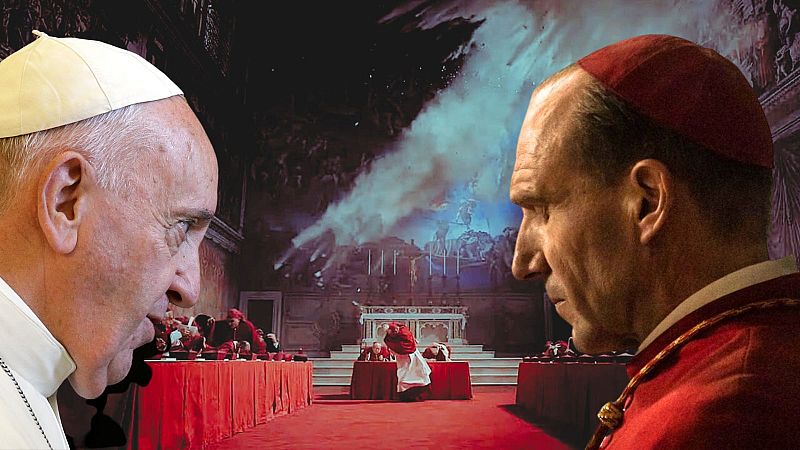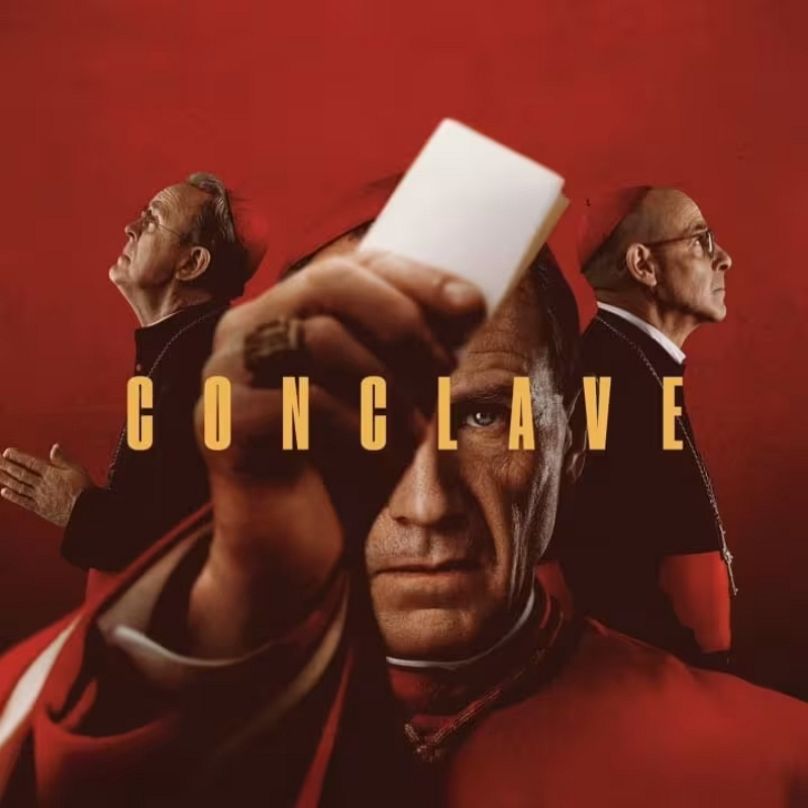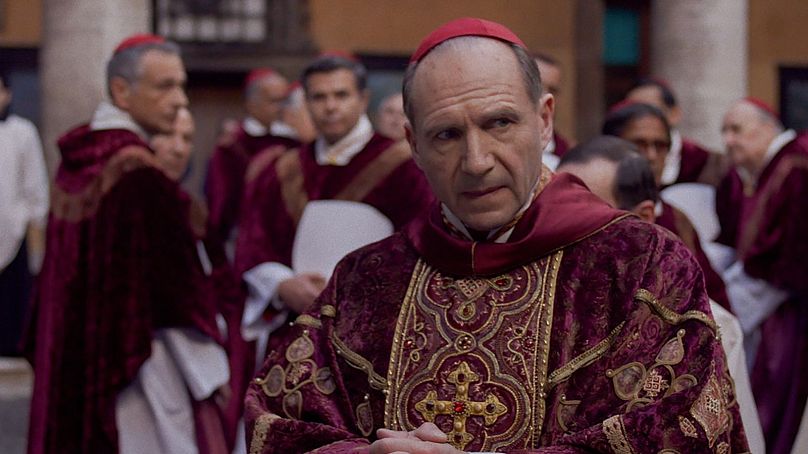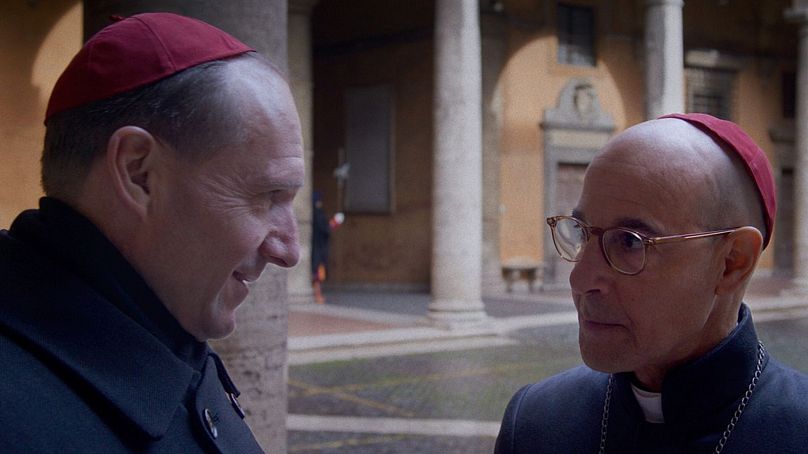
The death of Pope Francis on Monday 21 April has seen a renewal of interest in the Oscar-winning film Conclave and resulted in an increase in home viewership numbers.
The 2024 movie, directed by Edward Berger and revolving around the selection of a new pontiff, is available on various PVOD (premium video on demand) platforms and is currently streaming on Amazon Prime Video.
According to Luminate, which tracks viewership of streaming content, Conclave spiked 283% on Monday as word of Pope Francis’ death hit the headlines. To put that figure in context, Conclave was generating around 1.8 million minutes viewed on 20 April; by the end of 21 April, that number rocketed to 6.9 million minutes viewed.
Another Vatican-themed film, Netflix’s 2019 drama The Two Popes, also generated renewed interest, with viewership spiking 417% from Sunday, when it generated 290,000 minutes watched, to 1.5 million minutes watched on Monday.
No figures about Ron Howard’s Angels & Demons - but we recommend to stay well away from parachuting popes and antimatter explosions courtesy of Dan Brown.
What is Conclave about?

The papal thriller, based on Robert Harris' book of the same name, is a fictional take on the closed-door process of appointing a new pontiff, known as a conclave – which is set to begin in real life on 5 May.
Starring Ralph Fiennes, Stanley Tucci, John Lithgow and Isabella Rossellini, we see how the College of Cardinals gather to nominate the church's new leader. Fiennes' Cardinal Thomas Lawrence organizes the conclave after the previous pope died of a heart attack.
Four candidates emerge as frontrunners - each representing different values.
Joshua Adeyemi (Lucian Msamati) is a conservative; Goffredo Tedesco (Sergio Castellitto) believes the church has become too progressist; Aldo Bellini (Tucci) is a progressive in the mold of the previous pope; and Joseph Tremblay (Lithgow) is a moderate who may have been asked to resign by the late pontiff.
No one obtains the two-thirds majority required to assume the role, and even Lawrence receives votes - despite declaring he doesn't want to be the new pope.
As the days pass, bargaining begins, secrets about the candidates are unearthed and new alliances are formed as the cardinals are revealed to be entirely self-serving in their pursuit of power.
The vain war of factions also leads Sister Agnes (Rossellini) to demonstrate that the College of Cardinals is a retrograde organisation and has – to put it mildly – many failings when it comes to gender politics and ethics.
(WARNING: Spoilers ahead)
An attack by a suicide bomber outside the Vatican leads the traditionalist Tedesco to call for a holy war, while Cardinal Vincent Benitez (Carlos Diehz) makes a rousing speech about tolerance. He declares that violence should not be met with more violence and that the church needs to focus on the future.
After a lot of cattiness, Benitez is elected as the church's new leader.
However, questions remain about the mysterious archbishop, who appears to have an undisclosed health issue. Lawrence discovers that the late pope paid for Benitez to fly to Switzerland for a medical procedure - though Benitez ended up cancelling it.
The final scenes of Conclave see Lawrence confronting Benitez about the nature of his aborted Swiss trip.
Moment of truth: Benitez is intersex and the late pope facilitated an appointment for a laparoscopic hysterectomy. Benitez, who identifies as male, tells Lawrence that he decided to not go through with the procedure.
"I am as God made me," he tells Lawrence, adding that he "exists between certainties."
Lawrence, who previously stated that "certainty is the great enemy of unity," hears his story and says: "Our faith is a living thing precisely because it walks hand in hand with doubt. If there is only certainty and no doubt, there would be no mystery, and therefore no need for faith."
Is Conclave based on a true story and how accurate is it?

As previously mentioned, Conclave was adapted from a 2016 novel by Robert Harris – the author best known for his works of historical fiction ("Fatherland", "Archangel", "Munich") and who wrote the screenplays for Roman Polanski’s The Ghost Writer and An Officer And A Spy. So no, it’s not based on a true story.
However, Harris did reveal in an interview with TIME in 2024 that elements of the story were inspired by real-life events.
"There's an alleged diary by a cardinal from the conclave that elected Ratzinger as Pope Benedict that describes the ballot process and an attempt to try and stop Ratzinger," he said.
"There was also a great liberal cardinal from Milan who was expected year after year to become the pope. He was always the favorite, but he only came third after the first ballot. That's the Stanley Tucci character in the movie and sets up the human drama, the man who's waited all his life only for it to slip away from him."
Regarding accuracy, Berger emphasized during the press tour for Conclave that visits to the Vatican, an on-set consultant helping to ensure accuracy for Catholic ritual, as well as the wealth of research made available by Harris, were instrumental. And many religious experts have praised the film for its detailed approach and its depiction of the selection of a new pope.
Kathleen Sprows Cummings, a historian of Catholicism at Notre Dame, told the Guardian: “They got a lot of the details right… The movie did a really good job of balancing the human – people, men who are ambitious, who have very strong feelings about what the church needs”.
Cummings also praised the details in the film, adding: “They’ll be having dinners, they’ll be gathering in apartments… There will be: ‘Who’s supporting who? Is there a clear majority going in? Is there a clear front runner going in?’ That’s all happening.”
Indeed, cardinals in the film are seen living in the Casa Santa Marta, a guesthouse on the grounds of the Apostolic Palace in the Vatican City – something which will happen at the beginning of next month.
Berger's film also accurately depicts the voting process, the need to sweep the Sistine Chapel for electronic listening devices prior to voting, and what happens when a two-thirds majority is not reached – ie: the votes threaded together and burnt with an additive to produce black smoke, as opposed to the white smoke when a candidate is elected.
According to Rev. Thomas Reese, a columnist at Religion News Service with a PhD in Political Science from the University of California, Berkeley, the film was faithful to the truth. "The voting procedure was done very well," Reese said.
Bill Cavanaugh, a professor of Catholic Studies at DePaul University, agreed: “Certainly the mise-en-scene of the movie, they take pains to be very accurate on that.”
However, Cavanaugh stated that the characters were “a little bit exaggerated” and that cardinals “don’t fall neatly into progressive and conservative camps. In general, it’s much more of a mixed bag.”
What does Conclave get wrong?

As with all Hollywood takes, some veracity is sacrificed for dramatic effect and other elements are added to ensure viewers remain on tenterhooks.
Conclave’s warring factions are very clear and at times bordering on caricature, but it is true that some popes are more liberal than others. Pope Francis, for example, diverged from his predecessors when it came to gay rights and climate change. He frequently decried global warming and embraced LGBTQ individuals – even if he did stop short of full acceptance.
So the film’s depiction of the conversative factions within the Vatican – while seemingly exaggerated – are based in truth.
Two major details seem to be sticking points, however.
Fiennes' character Cardinal Lawrence is tasked with overseeing the conclave and is depicted in the film as fulfilling the roles of both the camerlengo (the person who traditionally takes over the Holy See) and the dean of the College of Cardinals. In reality, these are two separate roles.
Then there’s Cardinal Vincent Benitez (Diehz), who was made a cardinal in pectore - a Latin phrase referring to a process where appointments are made in secret. Contrary to what the film depicts, cardinals who have only been named in secret cannot take part in a conclave unless his name was announced by the pope before he died. This is not the case in the film.
As for the denouement – considered by some as anti-Catholic propaganda – it feels like a hopeful one, showing that progress is possible even within an organisation viewed by some as archaic and retrograde.
Oh, and regarding the humorous sight of Cardinal Tedesco vaping, no insight on whether cardinals hit the pens... However, some are smokers, so who knows?
Where to watch Conclave?
Conclave is available to stream on Amazon Prime Video. It’s well worth it – not just for its accuracies with regards to the rituals inherent to the death of a pope, but chiefly because it’s a thrilling watch that shines due to a stellar ensemble cast.
The upcoming conclave in the wake of Pope Francis' death will last significantly longer than the movie’s 120-minute runtime.
Whether it’ll be as dramatic, we may never know...







